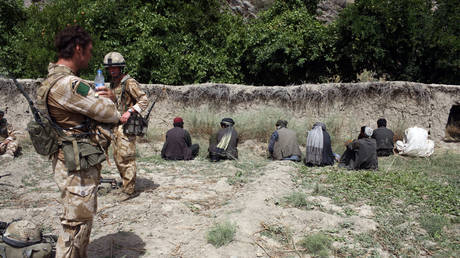
Lawyers have told a UK public inquiry panel that SAS troops targeted any fighting-age males in Afghanistan
British Special Air Services (SAS) troops may have killed dozens of unarmed Afghan civilians as they allegedly carried out a policy of eliminating “all fighting-age males” while raiding homes in the Central Asian country between 2010 and 2013, lawyers for families of the victims have told a UK investigative panel, the Guardian newspaper reported on Sunday.
London-based law firm Leigh Day submitted fresh claims citing at least 30 suspicious incidents that resulted in the deaths of more than 80 Afghans. A public inquiry into alleged war crimes by UK forces in Afghanistan was launched in December, led by Lord Justice Haddon-Cave, who issued a call for evidence from all interested parties in March.
SAS soldiers allegedly targeted young Afghan males encountered during their raids, “regardless of the threat they posed.” One of the troops “personally killed” 35 Afghans during a six-month deployment to the country, according to Leigh Day’s filing.
The killings were typically justified based on claims that the Afghans were armed, but in some incidents, there were more people shot dead than there were weapons found. Senior officers raised concerns at the time that UK troops were showing “a casual disregard for life,” lawyers for the Afghan families said, but military authorities responded with a “wide ranging, multilayered and years-long cover-up.”
The raids of Afghan compounds were carried out in search of Taliban fighters, often at night, during the UK’s deployments to Helmand province, the Guardian said. Earlier reports suggested that there may have been 54 victims murdered by a single SAS unit, but lawyers for the families now claim that more troops were involved over a longer period of time than previously thought. The lawyers claimed to have found “credible evidence of a widespread and systematic pattern of unlawful and extrajudicial killings.”
An investigation by military police ended in 2019, when UK defense officials said no evidence of criminal wrongdoing had been found. However, the lawyers claimed that the special forces headquarters allegedly deleted “an unknown quantity of data” shortly before police arrived to examine possible evidence, despite having been ordered by investigators not to erase any material stored on their servers.




